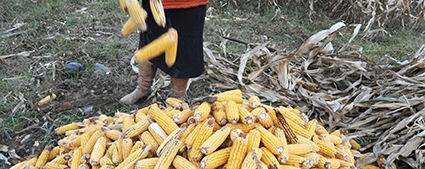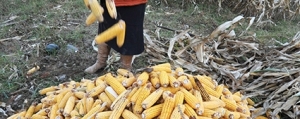Policy Makers and International Donors Reach Out to the Farming Community
Grey skies sifted an even light over the abandoned industry on the Mtkvari’s left bank, a thought-provoking backdrop for participants of the National Conference for Agricultural Extension for Georgia, which opened early Monday morning at the Radisson Blu.
Agricultural Extension – sometimes referred to instead as Agricultural Advisory Services – refers to programs of continuing education in the agricultural sector which attempt to increase the theoretical knowledge and practical skills of those who work the land. Georgia’s badly lagging agricultural sector would, conference organizers premised, benefit immensely from an expanded Agricultural Extension program.
By any account, Georgia needs change. Although roughly 50% of the population is engaged with agricultural work – a purposefully broad phrase, one of many used to allow for the purely subsistence farming occurring in rural areas across the country – only less than 10% of the country’s GDP comes from agriculture.
Over the course of the day, this depressed state of country affairs was illustrated for the audience in various ways. The share of GDP was at one point contrasted with Armenia – agriculture contributes to 23% of the GDP there. A slide was shown indicating that, seen from above, a single French farm worker appears to be as productive as six of his Georgian counterparts.
The findings of a recent survey of farmers in Georgia, which aimed to “better estimate the gap in (agricultural) knowledge”, were presented in-depth by Dr. Florian Biermann of the International School of Economics (ISET), offering some of the day’s most cutting insight. On average, surveyed households were farming only around 0.8 hectares of land. Nearly fifteen hundred of them were working on less than 0.4 hectares.
The real question of the conference, however, wasn’t how much land individuals have to work with, but rather how much individuals know about the art of cultivation.
“What determines agricultural productivity? Of course – ” this is Dr. Biermann, spreading plain the logic behind Agricultural Extension as a policy pursued – “of course there are couple of factors. There is the use of technology; capital availability; there are natural conditions; but there is also knowledge and skills. And knowledge and skills play a special role in generating agricultural productivity. Because knowledge and skills not only directly affect agricultural productivity, they also affect how you can use technology. Whether you have capital available - if you can’t write a good business plan it’s difficult to get a good loan from the bank. And it also helps you to deal with natural conditions. On the other hand, if you don’t have this knowledge, it can really stifle all these other areas, all these other areas of productivity.”
The trouble faced by Georgia today, then, long recognized but better quantified by the survey, is exactly the lack of contemporary, context-specific, business- and technology-savvy knowledge and skills. Over the last four years, only 4% of survey respondents reported having received agricultural training; in the last three years only 10% reported having received any kind of advisory service assistance or consultation at all.
The payoff of properly increasing the nation’s aggregate agricultural knowledge could be huge. Closing the knowledge gap in soil preparation by one “step”, Dr. Biermann explained by way of example, could increase wheat production per square meter by 80 grams.
The conference was organized jointly by the United Nations Development Programme (UNDP) in Georgia, the Swiss Cooperation Office in the South Caucasus, the Ministry of Agriculture of Georgia, and the Ministry of Education and Science of Georgia. The farmer survey had taken place under the auspices of the UNDP in Georgia; its deputy head, Shombi Sharp, provided the first opening statements.
“Here, we’re targeting farmers of all different sizes, providing them with the tools, knowledge, the information that they need to be able to improve their crop output, improve incomes and livelihoods for their families,” Mr. Sharp said. “The evidence is quite clear from international experience that a well-developed system of Agricultural Extension is a key prerequisite of a modern society.”
Representatives from Switzerland and Denmark were also on hand, discussing their experience with Agricultural Extension policies and programs. The conference continued with a panel discussion and unconventional bistro-counter interview – all parties stood at small tables on the hastily rearranged stage, where minutes earlier 9 plush chairs had lounged – after lunch. Further workshops and field visits took place Tuesday and Wednesday of this week.
Robert Isaf











